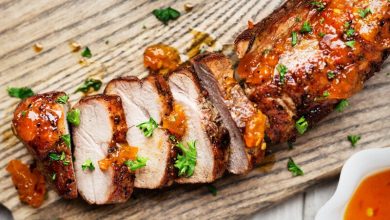Ajvar is a delicious roasted red pepper and eggplant (aubergine) spread or condiment that originates from the Balkan region, particularly Serbia, Croatia, and North Macedonia. It has a rich history and is a popular addition to various dishes. Here’s detailed information on Ajvar:
What is Ajvar?
Ajvar is a thick, savory spread made primarily from roasted red peppers and eggplant. It is known for its smoky flavor, slightly sweet taste, and vibrant red color. The name “Ajvar” is derived from the Turkish word “havyar,” which means caviar, although there is no relation in terms of ingredients.
History:
The history of Ajvar can be traced back to the Balkan region, where it has been a traditional food for centuries. It was originally made as a way to preserve peppers and eggplants for consumption during the winter months. Over time, it became a beloved condiment and a staple in Balkan cuisine.
Components:
The main components of Ajvar are:
- Red Peppers: These are the primary ingredient and provide the signature color and sweet, smoky flavor to Ajvar.
- Eggplant (Aubergine): Eggplants add a creamy texture and depth of flavor to the spread.
- Garlic: Garlic is often used for its aromatic and slightly pungent taste.
- Olive Oil: Olive oil is used to give the spread a smooth and luscious consistency.
- Vinegar: Vinegar adds a tangy element and helps with preservation.
- Salt and Pepper: These are used for seasoning.
Steps to Prepare Ajvar:
Here’s a basic recipe for homemade Ajvar:
-
Roast the Peppers and Eggplant: Place whole red peppers and eggplants on a baking sheet and roast them in the oven or over an open flame until the skins are charred and blistered. This process can take about 20-30 minutes in the oven or 10-15 minutes over an open flame. Be sure to turn them occasionally to ensure even roasting.
-
Peel and Seed: After roasting, place the peppers and eggplants in a bowl and cover them with a cloth to steam. This makes it easier to peel off the skin. Once they are cool enough to handle, peel off the skin, remove the seeds from the peppers, and finely chop the flesh.
-
Blend: In a food processor or blender, combine the roasted and chopped peppers and eggplants with minced garlic, olive oil, vinegar, salt, and pepper. Blend until you achieve a smooth and creamy consistency.
-
Cook: Transfer the mixture to a pan and simmer it over low heat for about 15-20 minutes, stirring occasionally. This helps thicken the spread and meld the flavors.
-
Cool and Store: Let the Ajvar cool to room temperature before transferring it to airtight containers. Store it in the refrigerator for up to a week, or you can also preserve it by canning.
Time Needed:
The total time needed to prepare Ajvar can vary, but on average, it takes approximately 1.5 to 2 hours, including the roasting, peeling, blending, and cooking stages. The exact time may depend on your roasting method and the quantity you’re preparing.
Enjoy your homemade Ajvar as a condiment, dip, or spread in various dishes!
Certainly, here are the nutrition facts and health information for Ajvar:
Nutrition Facts (per 2 tablespoons or approximately 30 grams of Ajvar):
- Calories: 35
- Total Fat: 2 grams
- Saturated Fat: 0 grams
- Trans Fat: 0 grams
- Cholesterol: 0 milligrams
- Sodium: 160 milligrams
- Total Carbohydrates: 4 grams
- Dietary Fiber: 1 gram
- Sugars: 2 grams
- Protein: 1 gram
- Vitamin A: 15% of the Daily Value (DV)
- Vitamin C: 30% DV
- Calcium: 0% DV
- Iron: 2% DV
Health Information:
-
Low in Calories: Ajvar is relatively low in calories, making it a suitable addition to your diet if you’re watching your calorie intake.
-
Rich in Vitamins: Ajvar is notably high in Vitamin A and Vitamin C. Vitamin A is essential for eye health and immune function, while Vitamin C is a powerful antioxidant that supports your immune system and skin health.
-
Low in Saturated Fat and Cholesterol: Ajvar is naturally low in saturated fat and contains no cholesterol, which is beneficial for heart health.
-
Good Source of Fiber: It contains a moderate amount of dietary fiber, which can aid digestion and help you feel full.
-
Low in Protein and Fat: Ajvar is not a significant source of protein or fat, so it’s typically not considered a primary protein or fat source in your diet.
-
Sodium Content: Ajvar can be relatively high in sodium, so if you’re watching your sodium intake, it’s essential to consume it in moderation.
-
Nutrient Variety: While it may not provide a wide range of nutrients, Ajvar can still be a flavorful and nutritious addition to your meals and snacks, especially when combined with other nutrient-rich foods.
Keep in mind that the specific nutrition content of Ajvar may vary depending on the brand or homemade recipe, so it’s a good idea to check the nutrition label if you have specific dietary concerns. Enjoy Ajvar in moderation as part of a balanced diet for a flavorful and nutritious addition to your meals.




